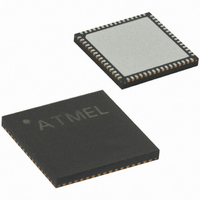AT90CAN32-16MU Atmel, AT90CAN32-16MU Datasheet - Page 294

AT90CAN32-16MU
Manufacturer Part Number
AT90CAN32-16MU
Description
IC MCU AVR 32K FLASH 64-QFN
Manufacturer
Atmel
Series
AVR® 90CANr
Specifications of AT90CAN32-16MU
Core Processor
AVR
Core Size
8-Bit
Speed
16MHz
Connectivity
CAN, EBI/EMI, I²C, SPI, UART/USART
Peripherals
Brown-out Detect/Reset, POR, PWM, WDT
Number Of I /o
53
Program Memory Size
32KB (32K x 8)
Program Memory Type
FLASH
Eeprom Size
1K x 8
Ram Size
2K x 8
Voltage - Supply (vcc/vdd)
2.7 V ~ 5.5 V
Data Converters
A/D 8x10b
Oscillator Type
Internal
Operating Temperature
-40°C ~ 85°C
Package / Case
64-VQFN Exposed Pad, 64-HVQFN, 64-SQFN, 64-DHVQFN
Processor Series
AT90CANx
Core
AVR8
Data Bus Width
8 bit
Data Ram Size
2 KB
Interface Type
2-Wire, SPI, USART
Maximum Clock Frequency
16 MHz
Number Of Programmable I/os
53
Number Of Timers
2
Operating Supply Voltage
0.5 V to 0.6 V
Maximum Operating Temperature
+ 85 C
Mounting Style
SMD/SMT
3rd Party Development Tools
EWAVR, EWAVR-BL
Development Tools By Supplier
ATAVRDRAGON, ATSTK500, ATSTK600, ATAVRISP2, ATDVK90CAN1, ATADAPCAN01
Minimum Operating Temperature
- 40 C
On-chip Adc
10 bit, 8 Channel
Cpu Family
90C
Device Core
AVR
Device Core Size
8b
Frequency (max)
16MHz
Total Internal Ram Size
2KB
# I/os (max)
53
Number Of Timers - General Purpose
4
Operating Supply Voltage (typ)
3.3/5V
Operating Supply Voltage (max)
5.5V
Operating Supply Voltage (min)
2.7V
Instruction Set Architecture
RISC
Operating Temp Range
-40C to 85C
Operating Temperature Classification
Industrial
Mounting
Surface Mount
Pin Count
64
Package Type
QFN EP
Package
64QFN EP
Family Name
90C
Maximum Speed
16 MHz
For Use With
ATSTK600-TQFP64 - STK600 SOCKET/ADAPTER 64-TQFP770-1007 - ISP 4PORT ATMEL AVR MCU SPI/JTAGATDVK90CAN1 - KIT DEV FOR AT90CAN128 MCU
Lead Free Status / RoHS Status
Lead free / RoHS Compliant
Available stocks
Company
Part Number
Manufacturer
Quantity
Price
Company:
Part Number:
AT90CAN32-16MU
Manufacturer:
ATMEL
Quantity:
717
- Current page: 294 of 428
- Download datasheet (6Mb)
294
AT90CAN32/64/128
The IEEE std. 1149.1 also specifies an optional TAP signal; TRST – Test ReSeT – which is not
provided.
When the JTAGEN fuse is unprogrammed, these four TAP pins are normal port pins and the
TAP controller is in reset. When programmed and the JTD bit in MCUCR is cleared, the TAP
input signals are internally pulled high and the JTAG is enabled for Boundary-scan and program-
ming. In this case, the TAP output pin (TDO) is left floating in states where the JTAG TAP
controller is not shifting data, and must therefore be connected to a pull-up resistor or other
hardware having pull-ups (for instance the TDI-input of the next device in the scan chain). The
device is shipped with this fuse programmed.
For the On-chip Debug system, in addition to the JTAG interface pins, the RESET pin is moni-
tored by the debugger to be able to detect external reset sources. The debugger can also pull
the RESET pin low to reset the whole system, assuming only open collectors on the reset line
are used in the application.
• TCK: Test Clock. JTAG operation is synchronous to TCK.
• TDI: Test Data In. Serial input data to be shifted in to the Instruction Register or Data Register
• TDO: Test Data Out. Serial output data from Instruction Register or Data Register (Scan
(Scan Chains).
Chains).
7679H–CAN–08/08
Related parts for AT90CAN32-16MU
Image
Part Number
Description
Manufacturer
Datasheet
Request
R

Part Number:
Description:
Manufacturer:
Atmel Corporation
Datasheet:

Part Number:
Description:
Manufacturer:
Atmel Corporation
Datasheet:

Part Number:
Description:
IC MCU AVR 32K FLASH 64-TQFP
Manufacturer:
Atmel
Datasheet:

Part Number:
Description:
Microcontroller with 32K/64K/128K Bytes of ISP Flash and CAN Controller
Manufacturer:
ATMEL [ATMEL Corporation]
Datasheet:

Part Number:
Description:
8-bit Microcontroller with 16K/32K/64K Bytes In-System Programmable Flash8-bit Microcontroller with 32K/64K/128K Bytes of ISP Flash and CAN Controller
Manufacturer:
ATMEL [ATMEL Corporation]
Datasheet:

Part Number:
Description:
MCU AVR 32K FLASH 16MHZ 64-TQFP
Manufacturer:
Atmel
Datasheet:

Part Number:
Description:
DEV KIT FOR AVR/AVR32
Manufacturer:
Atmel
Datasheet:













